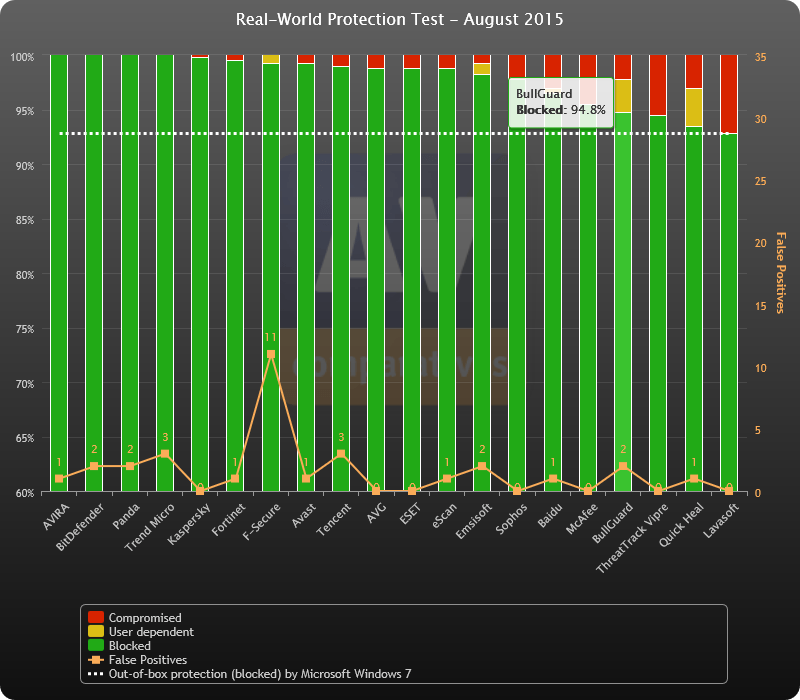

- Messages
- 2,467
- Location
- Bamberg Germany
Statistics - AV-Comparatives
AV TEST for Home User
Before asking "What's the best AV" look at the above links.
Your choice for an Anti-Virus is the MOST IMPORTANT choice you'll make for your systems security so choose well and thoughtfully.
The choice of AV is a question of preference, habits, amount of protection needed(Basic versus Advanced), resource use(how much RAM do you have & which generation CPU do you have, can you run it in the background without your system freezing up), and of course money(free or paid).
Some people like an AV with an user interface that that has all the "bells & whistles" to look at and set(so they know it's running) like telling them every tracking cookie on their system(not really needed, they'll be back the next time you visit a/the site), others "like me" just want it to run in the background(set & forget) until it finds a real threat. This is what I mean by preference.
For Basic verses Advanced, I mean one needs added protection when doing online money transactions(then you'll probably need to get a paid version).
Another thing to look at, when choosing an AV, is their "False Positives" rate. This was brought to my attention through a Security News posting from A Guy(Thanks for always keeping us informed Bill). If you follow the link, it will explain why this is very important under "Why Does It Matter?".
As a last note, sometimes a 3rd party AV will conflict with Windows Updates so if you start seeing a problem, you'll need to go to your AV's website to get more information at their forums and sometimes wait until they have corrected the problem and update the AV. For example:
This is not new from 2010:
AV TEST for Home User
Before asking "What's the best AV" look at the above links.
Your choice for an Anti-Virus is the MOST IMPORTANT choice you'll make for your systems security so choose well and thoughtfully.
The choice of AV is a question of preference, habits, amount of protection needed(Basic versus Advanced), resource use(how much RAM do you have & which generation CPU do you have, can you run it in the background without your system freezing up), and of course money(free or paid).
Some people like an AV with an user interface that that has all the "bells & whistles" to look at and set(so they know it's running) like telling them every tracking cookie on their system(not really needed, they'll be back the next time you visit a/the site), others "like me" just want it to run in the background(set & forget) until it finds a real threat. This is what I mean by preference.
For Basic verses Advanced, I mean one needs added protection when doing online money transactions(then you'll probably need to get a paid version).
Another thing to look at, when choosing an AV, is their "False Positives" rate. This was brought to my attention through a Security News posting from A Guy(Thanks for always keeping us informed Bill). If you follow the link, it will explain why this is very important under "Why Does It Matter?".
As a last note, sometimes a 3rd party AV will conflict with Windows Updates so if you start seeing a problem, you'll need to go to your AV's website to get more information at their forums and sometimes wait until they have corrected the problem and update the AV. For example:
Source ZDNetSummary:Avira has sent out a defective antivirus update that is causing paid versions of its product to block critical Windows processes and third-party software, effectively rendering millions of PCs unusable.
This is not new from 2010:
Source techweekeuropePCs running Windows XP have been brought to a standstill worldwide after McAfee VirusScan Enterprise issued a false positive
Last edited:
My Computer
System One
-
- OS
- Windows 8.1 Update Pro in Hyper-V/Windows 10 Pro 64 bit
- Computer type
- PC/Desktop
- System Manufacturer/Model
- Cliff's Black & Blue Wonder
- CPU
- Intel Core i9-9900K
- Motherboard
- ASUS ROG Maximus X Hero
- Memory
- 32 GB Quad Kit, G.Skill Trident Z RGB Series schwarz, DDR4-3866, 18-19-19-39-2T
- Graphics Card(s)
- ASUS GeForce RTX 3090 ROG Strix O24G, 24576 MB GDDR6X
- Sound Card
- (1) HD Webcam C270 (2) NVIDIA High Definition Audio (3) Realtek High Definition Audio
- Monitor(s) Displays
- BenQ BL2711U(4K) and a hp 27vx(1080p)
- Screen Resolution
- 1920 x 1080 x 32 bits (4294967296 colors) @ 60 Hz
- Hard Drives
- C: Samsung 960 EVO NVMe M.2 SSD
E: & O: Libraries & OneDrive-> Samsung 850 EVO 1TB
D: Hyper-V VM's -> Samsung PM951 Client M.2 512Gb SSD
G: System Images -> HDD Seagate Barracuda 2TB
- PSU
- Corsair HX1000i High Performance ATX Power Supply 80+ Platinum
- Case
- hanteks Enthoo Pro TG
- Cooling
- Thermaltake Floe Riing RGB TT Premium-Edition 360mm and 3 Corsair blue LED fans
- Keyboard
- Trust GTX THURA
- Mouse
- Trust GTX 148
- Internet Speed
- 25+/5+ (+usually faster)
- Browser
- Edge; Chrome; IE11
- Antivirus
- Windows Defender of course & Malwarebytes Anti-Exploit as a
- Other Info
- Router: FRITZ!Box 7590 AX V2
Sound system: SHARP HT-SBW460 Dolby Atmos Soundbar
Webcam: Logitech BRIO ULTRA HD PRO WEBCAM 4K webcam with HDR





